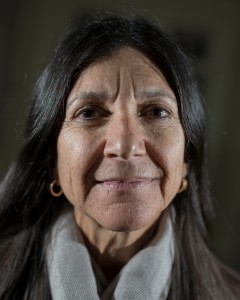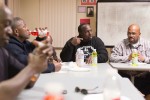The men gathered together in a cramped auditorium and began to dig into their plates piled with mashed potatoes, green beans and hamburger patties. Some dressed in business suits, others in plain white T-shirts and jeans.
They weren’t all related by blood, but they laughed and joked as if they grew up together.

Photo by Brandon Choe/Daily Bruin senior staff
Jorja Leap, a UCLA anthropologist and professor in the department of social welfare at the Luskin School of Public Affairs, sat at the head of a collection of tables exchanging conversation with a group of 25 to 30 that drifted in and out of the room.
A paper green Christmas tree hung on the wall leftover from the holidays. Pictures of men, women and children filled the room – the faces of the Jordan Downs community in the heart of Watts, about 20 miles southeast of UCLA.
The group prepared for Wednesday’s meeting of Project Fatherhood, a parenting program where fathers struggling to reconnect with their families can support each other. The program doubles as a form of gang intervention. Leap co-facilitates the weekly meetings with three former gang members.
At times they were vulnerable, sharing stories of supporting their children. One man just discovered that his son, who he thought was on track to graduate high school, was several credits short of a diploma. Another shared his frustration over trying to motivate his son academically when no one pushed him at school.
The men in the project range in age from 17 to more than 60 years old. Some spoke English, others only Spanish.
But all who come to the weekly dinners at the community center have one goal: to learn to be better fathers to their children.
“What we have done … is prepare the plate for the fathers. We have put everything on the plate as you prepare to eat your dinner,” said Elder Michael “Big Mike” Cummings, a co-facilitator at Project Fatherhood. “Now it’s just time for them to eat off that plate and survive as being fathers.”
***
Leap has been involved in work with gangs for more than 30 years.
“Putting money into human services (and) bringing together families and communities is the best possible crime prevention,” Leap said.
She spends much of her focus on street intervention, which involves preventing young people from joining gangs, helping them leave gangs and helping former gang members become active parents to their children.
Leap is currently conducting a study of Homeboy Industries, an umbrella gang intervention program. For the past five years, she studied 300 participants in the program, which provides jobs, training, tattoo removal and other services to former gang members.
Her research found that Homeboy Industries’ recidivism rate, or rate of former members relapsing back into gang life, is 30 percent – 40 percent lower than the national average for gang intervention programs.
Leap knows Homeboy is doing something right – they are basing the program in the community.
The practice of street intervention began in the 1980s as a way to broker peace treaties between warring gang factions and has continued to evolve, said Kenny Green, a street interventionist who was a guest speaker in Leap’s social welfare class.
“Once the violence was put down, we found ourselves unable to figure out what to do with these young people, what the next step was,” said Green, who is also a former gang member.
Programs such as Project Fatherhood and Homeboy Industries began to sprout up as a tool to prevent young men from falling into gang life, Green said.
Such community-based plans are often more effective than an outside organization, said Andre “Lowdown” Christian, a co-facilitator of Project Fatherhood and former gang member.
“(An outsider) has no idea where we’re coming from. A book structure doesn’t know anything about what we need,” Christian said.
Donald Twin James, a participant in Project Fatherhood, grew up in Jordan Downs and has always loved singing and music.
A music program in the housing project might have helped steer him out of trouble when he was younger, he said, but instead he ended up spending 32 years of his life in prison.
In a prison production of “Waiting for Godot,” James said he was inspired to change the course of his life. During the play, two homeless men sit on a mountaintop devoid of all other civilization and wait for the nondescript Godot.
James saw many parallels in the play to his life.
“It was just like prison: you’re waiting on mail, you’re waiting on visits, you’re waiting on the courts, you’re waiting on the toilets, you’re waiting to go eat,” James said. “I was tired of waiting.”
James said that, before Project Fatherhood, he did not think he was capable of instituting a music program for the housing project. But now, he said he believes he can with the resources he has – and he’s not going to wait anymore.
Video: Project Fatherhood Facilitates Discussion
***
Leap received her bachelor’s degree in sociology, master’s in social welfare and doctorate in psychological anthropology at UCLA. Now, she’s been a professor for 22 years.
But she says she is rarely in her office. At the beginning of Wednesday’s meeting she said her affiliation is with Project Fatherhood rather than UCLA.
“I’m very grateful UCLA has given me a home,” Leap said. “But my heart and soul are in the community, that’s where I work.”
She works to combine her service with street interventionists with her lectures to her students, sometimes bringing the former gang members she works with to speak to her classes.
At her social welfare class at UCLA on Monday, Cummings spoke before a crowd of hundreds of students about why he got started in street intervention.
“I want (young people in the neighborhood) to ride off my mistakes,” he said. “They shouldn’t have to waste 20 to 30 years of their life until they say, ‘I’m tired of this,’ and want to change. I’ll tell you my story so you don’t have to go through what I went through.”
Other gang interventionists said they think community-based organizations are the best way to change the course of former gang members’ lives.
“I’m tired of seeing the neighborhood attacking itself, eating itself from the inside out,” said Odie Ervin, a street gang interventionist who got out of jail six months ago and spoke to Leap’s class. “All change starts from within.”
***
The relatively new gang intervention programs are making headway though they continue to struggle financially, Leap said.
Mark Leap, Jorja’s Leap’s husband and a former deputy chief with the Los Angeles Police Department said he agrees with the approach of programs, like Homeboy Industries, which he said get at the root of the issue.
“You’re never going to be able to arrest your way out of the gang problem,” Mark Leap said. “Use your resources to pinpoint those areas in an effort to suppress the crime but also to work with the community.”
Jorja Leap estimates that street interventionists make about $2,000 a month with no benefits or pension. The $300,000 grant that Project Fatherhood received over a 3-year period from Children’s Institute Inc. will be all used up by September, Leap said. Homeboy Industries also struggles to find sustainable funding.
Leap said she hopes in the future UCLA students will contribute to fundraising for street intervention, such as fundraising for a trip for families outside the housing project.
“None of them have been to Disneyland before. They need to see that’s there’s a world beyond Jordan Downs,” she said.
***
The fathers are seated now, cleaning the last of the mashed potatoes from their forks. Throughout the meeting, they come and go as they please – they don’t often sit still.
A man in a green jacket hovers near the door frame for nearly half the meeting, listening to the other fathers chat.
As the other men swap stories about their weeks, he gingerly steps into the room and fills up a plate, before finally settling into a chair and joining the group.

Really cool to see what these guys are doing to improve the community. It really is something to admire. Some of these people need guidance and knowledge that there’s more to the world than joining a gang and committing crimes. I’m glad these men are promoting healthier lives and proving these guys with an opportunity. There are some bad gang members out there, but it takes a lot of courage to walk into a place like Homeboy Industries yearning for a change. And these man what to change. Well some at least. I hope more people see this out there and prop to Dr. Leap for working and helping these lost men and women.